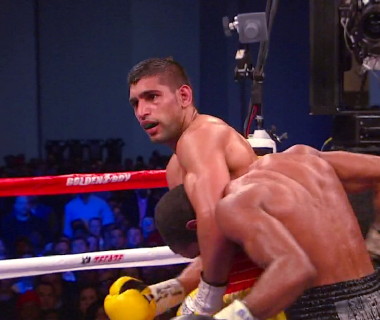 by Will Humphries: As the bell tolls for the start of 2012, Britain’s most well-known boxing star, Amir Khan, faces a make or break year. But the next twelve months are not pivotal in terms of proving his talent or class, he has long since accomplished this.
by Will Humphries: As the bell tolls for the start of 2012, Britain’s most well-known boxing star, Amir Khan, faces a make or break year. But the next twelve months are not pivotal in terms of proving his talent or class, he has long since accomplished this.
More pertinently this year Khan will either, as he desires, become a super-fight, pound for pound megastar fighter, or alternatively, fall into the all too familiar mould of the tenacious but inconsistent British boxer Stateside. His most recent loss to Lamont Peterson, regardless of its controversial nature, checked the previously surging momentum of his ascent to the zenith of contemporary boxing, a fight with Floyd Mayweather. But in rebounding from this setback and to rediscover the path to boxing greatness, Khan’s challenge is more complex and of greater scope, than avenging the Peterson defeat or overcoming any other pugilistic tests.
When Khan won his Olympic Silver medal in 2004, he returned home to a hero’s welcome. Success at the Olympics, a fan-friendly fighting style and a winning smile, Khan was the identikit British boxing star. And yet with his untimely and shocking KO at the hands of Breidis Prescott, 4 years on from his Athens glory, came a chorus of cheers and a sense of comeuppance. With his relocation to America came his tentative steps to redemption, which culminated in a courageous leap through a grueling 10th round with Marcos Maidana back to where he belonged; atop of his pedestal as a celebrated champion. A successful and emphatic victory in a unification bout with Zab Judah perpetuated his pathway to the highest echelon of boxing and after overcoming mandatory challenger Peterson it seemed 2012 would be the antithesis to the fabled apocalyptic stanza, and in fact prove to be the coronation of King Khan.
Except of course, Lamont Peterson (and referee Joe Cooper) had other ideas. And so with defeat returned the raft of criticism that Khan has battled against his entire career. His relationship with the British public and press has been more hit and miss than his recent trend of throwing flashy but haphazard combinations. But what causes this relatively frosty and spiky relationship between an elite British fighter and a population renowned for staunch and loyal support? Something is just not quite right. Initially Khan’s cherry picked route to success under Frank Warren and its juxtaposition with the physical and gritty boxing culture may have upset boxing fans. But Khan no longer navigates such a path, there is no question he will fight anyone. So then did Khan have the answer when he said in 2009, if he “were a white English fighter, maybe I’d have been a superstar in Britain”? If Khan’s racial identity is a (sub)conscious factor in his underwhelming relationship with the British public ,then his comments would certainly not have helped been well received in a society keen to obscure discussion on the continued existence of racial discrimination. Whether or not this awkward and taboo subject bristles under the surface for the rest of Khan’s career, it need not define him.
In spite of all these bumps in the road, Khan has one sure-fire route to unbridled public adoration. That much-talked about match up with Mayweather. The fight sells. Both men have enough devoted supporters, and enough equally passionate detractors to put on a monumental fistic extravaganza both sides of the Atlantic. Khan is an elite level fighter and to my mind deserves the steadfast acclaim and adulation of British fans. It goes without saying of course, that victory is not assured, not even necessarily much more than wishful thinking for Khan. But in doing battle with Mayweather, a man who has successfully forged a unique nexus between great and hate, Khan may well find a solution to his conundrum.